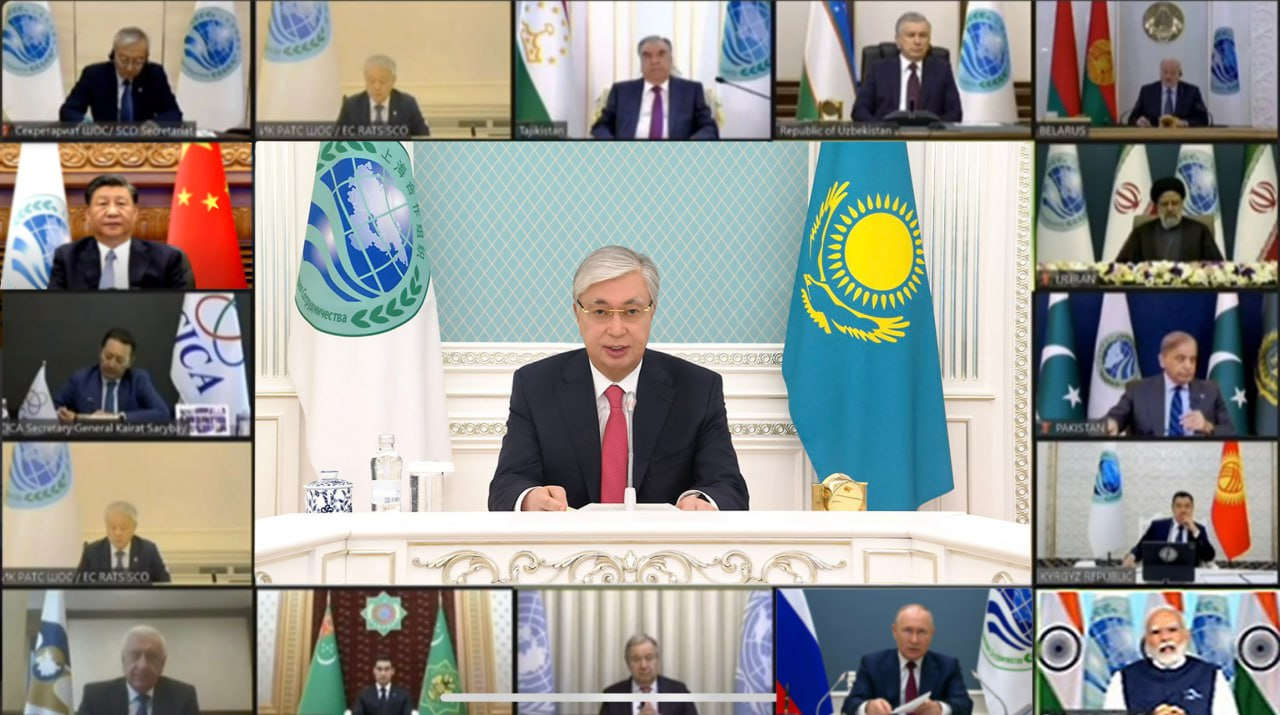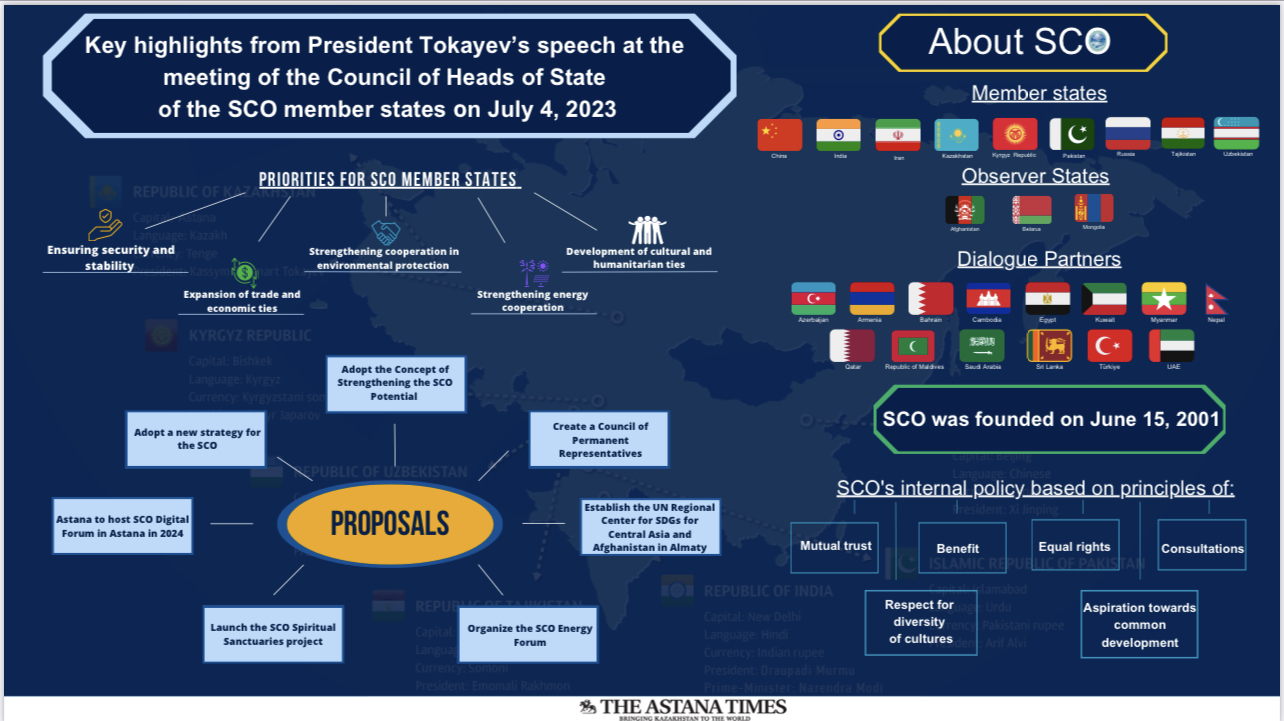ASTANA – President Kassym-Jomart Tokayev outlined priorities of strategic importance under Kazakhstan’s upcoming chairmanship of the Shanghai Cooperation Organization (SCO) following the July 4 SCO Summit online, reported the Akorda press service.

Kassym-Jomart Tokayev delivers remarks at the SCO Summit. Photo credit: Akorda.
Tokayev expressed gratitude to Indian Prime Minister Narendra Modi, who chaired the summit, for India’s successful chairmanship of the SCO and congratulated Iranian President Ebrahim Raisi on his country’s accession as a full member of the SCO. He added that the process of accepting Belarus as a member is nearing completion.
The President said the SCO is a successful multilateral association with significant international authority, accounting for a quarter of the global GDP and more than 15% of international trade.
Amid a radical transformation of the global order, an unprecedented increase in geopolitical tensions, intensification of trade and sanctions wars, and other challenges, Tokayev stressed the need to remain committed to building a more representative, democratic and multipolar world with the central and coordinating role of the United Nations.
Ensuring security and stability in the SCO space
President Tokayev suggested that the main task of the SCO countries should be to prevent a geopolitical rift between East and West. He informed that Kazakhstan, which begins its chairmanship of the SCO this month, will present the initiative On World Unity for a Just Peace and Harmony to strengthen confidence-building measures and maintain stability and security.

Key highlights from President Tokayev’s speech at the meeting of the Council of Heads of State of the SCO member states.
Highlighting the fight against the three forces of evil – transnational organized crime, drug trafficking and cybercrime – Tokayev emphasized the necessity to upgrade the Program of Cooperation on Combating Terrorism, Separatism and Extremism for 2025-2027. He also proposed to adopt the SCO Anti-Drug Strategy for 2024-2029 and the Action Program for its implementation.
“Particular attention should be paid to overcoming the crisis in Afghanistan,” he said. “It is important to continue providing assistance to the Afghan people under the auspices and coordination of the UN.”
Tokayev also noted the need to support the initiative to establish the UN Regional Center for Sustainable Development Goals for Central Asia and Afghanistan in Almaty.
Expanding trade and economic relations
Noting that not a single major economic project was implemented under the auspices of the SCO for more than 20 years, the President proposed to the SCO Council of Heads of Government to consider establishing a joint Investment Fund.
Tokayev suggested that the Astana International Financial Centre can be an effective platform for stimulating direct and portfolio investments in regional SCO projects, as it has absorbed the best experience of world financial institutions.
According to Tokayev, SCO’s economic agenda should prioritize creating favorable conditions for mutual trade growth, removing existing trade barriers and launching joint ventures.
He proposed to start creating a base of economic preferences for the SCO to increase its investment attractiveness.
Highlighting the prerequisites created by the Belt and Road Initiative and the Trans-Caspian International Transport Route for unlocking the great potential of the North-South and East-West corridors, Tokayev offered to establish a partner network of large strategic ports and logistics centers.
Strengthening energy cooperation
The President said it is necessary to coordinate the SCO Energy Strategy by the next summit in Astana to ensure energy balance, energy transition, and decarbonization of the economies and industry.
Tokayev said Kazakhstan is ready to host the SCO Energy Forum to consider consolidated approaches to ensure energy security and a balanced development of member countries.
Expanding cooperation in the digital sector
According to Tokayev, favorable conditions have been created in Kazakhstan for a comprehensive digital transformation. The country ranked 28th in the UN E-Government Development Index last year, the highest position among the SCO member states.
“Kazakhstan offers its services as a digital hub in the SCO space. Therefore, I believe it is important to host the SCO Digital Forum in Astana in 2024,” he said.
Fostering cooperation in environmental sphere
“Unfortunately, we are seeing a significant increase in various natural disasters – floods, droughts, fires, water and soil pollution,” the President noted.
In relation to this, Tokayev proposed to establish partnership relations between the SCO and the UN Environment Program, develop an agreement on cooperation on environmental protection, and adopt a program of cooperation for the development of specially protected natural areas and ecotourism.
Developing cultural and humanitarian ties
Covering 45% of the world’s population, the SCO has a huge tourism potential that has not been realized yet, the President noted. One of the measures Kazakhstan took last year was to introduce a visa-free regime for the citizens of China, India and Iran.
To fully contribute to preserving and promoting the common rich spiritual heritage, Tokayev suggested declaring Almaty the SCO tourist and cultural capital for 2023-2024 and launch the SCO Spiritual Sanctuaries project. Such a shrine of world significance in Kazakhstan is the Mausoleum of Khoja Ahmed Yassawi, he said, revealing plans to present it at the SCO’s Golden Horde and its Legacy conference in the city of Turkistan in southern Kazakhstan.
Tokayev said the time has come to adopt a new SCO development strategy to expand the agenda in the most promising areas of cooperation. He offered to establish a Concept of Strengthening the SCO Potential with due consideration of Kazakhstan’s proposals and create a Council of Permanent Representatives to the SCO, empowering them to advance the interests of member states.
“We should have our own vision of the future just and harmonious world, confidently follow the path of inclusive development and creative progress based on mutual responsibility and solidarity,” the President concluded.
At the end of the summit, the participants adopted the New Delhi Declaration and several other documents.

